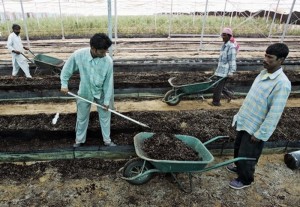
Reuters | July 17, 2009
Dubai: Wealthy Gulf states have no choice but to keep buying foreign land in their quest for food security, despite their growing concerns about instability in target countries and a rising backlash from farming communities.
Inflation almost doubled the price of basic food last year. Higher prices and shortages caused protests and violence globally and shook governments in the Middle East, which import more food than any other in the world. Gulf states, mostly desert, lack the water and farmland to feed themselves.
As they look for food security, Gulf states have spent billions of dollars of oil money on buying foreign farmland.
"We have no choice but to continue leasing and buying land," said Abdullah Al Obaid, head of the strategy unit at the Ministry of Agriculture in Saudi Arabia. The kingdom needs 2.6 million tonnes per year of wheat alone, and is abandoning a project to produce the grain domestically due to a shortage of water.
But once foreign land is acquired, operating the farms is no easy task, said Sudhakar Tomar, managing director of Hakan Agro DMCC, one of the leading food commodities trading companies in the Gulf region.
"Many of the countries that the Gulf is targeting are unstable socially and politically, that alone is a huge risk," he said.
Those countries include Iran, Pakistan, Sudan and Thailand, which have all seen political upheaval in the past year.
Sudan's Darfur remains a conflict zone, so investments that aim to develop farmland there can look optimistic.
Mirak Agricultural Service, the UAE's largest private agriculture firm, had a bitter experience with its investment in Iran after farmers held protests, hurting profitability, a company executive said.
"We are scaling down on our operations and would rather invest more in the UAE after farmers in Iran refused to work," Nejdeh Ghadimi, Mirak assistant managing director, said.
The company owns 200 hectares of farmland in the UAE and 16 hectares in Heshetgerd, west of Iran's capital Tehran.











